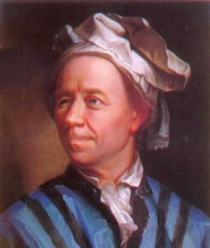to all areas of the pure and applied mathematics of his time, and laid the foundations of mathematical physics. Only four volumes of Euler’s collected works, the Opera Omnia, are devoted to number theory. Nevertheless, even if these had been his only contributions, he would still be a major figure in the history of mathematics. Euler's interest in number theory seems to have been stimulated by Christian Goldbach After reading some of Fermat’s number-theoretic works, Euler set about reconstructing elementary results and proving most of Fermat’s statements, making major new contributions along the way. His research covered all aspects of number theory - the theory of divisibility, generalization of Fermat's Little Theorem (known as Euler's Theorem), the law of quadratic reciprocity, quadratic forms, Diophantine equations, partitions of a number, analytic and algebraic number theory - just to name a few. Here, we will explore some of these conbtributions in more detail. |
Euler's Contribution
|

Leonhard Euler (1707 - 1783) |
Leonhard Euler is considered by many to be the greatest mathematician of the 18th century.The most prolific mathematician of all time, he made contributions |